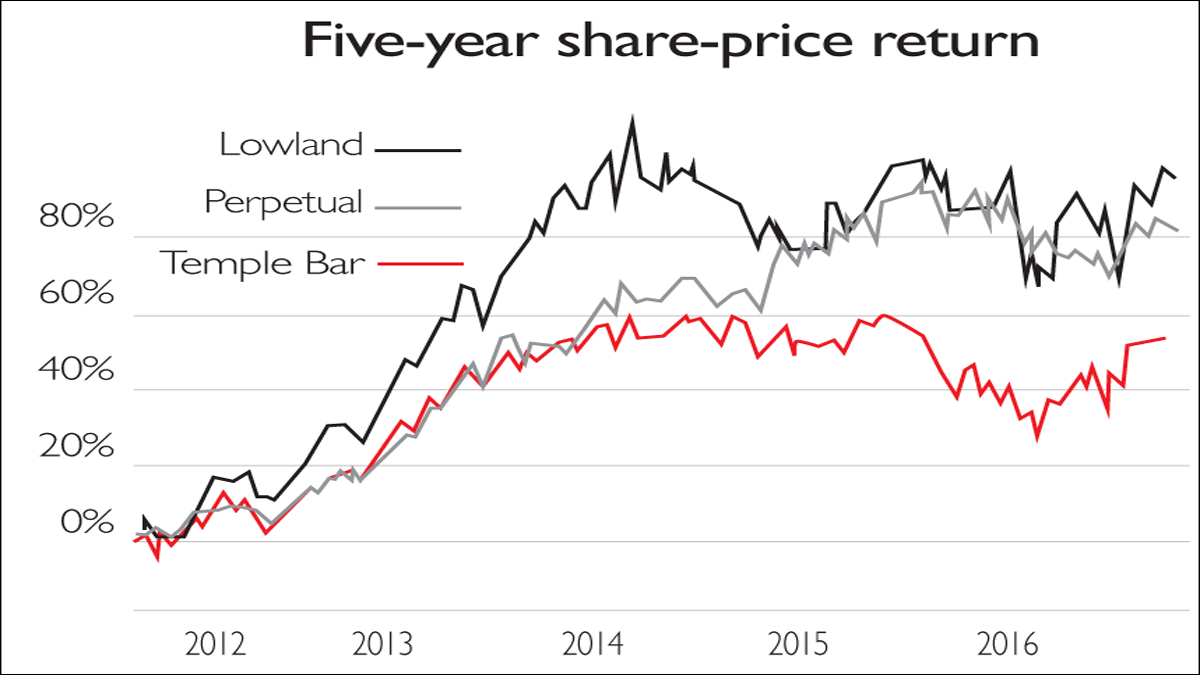Get the latest financial news, insights and expert analysis from our award-winning MoneyWeek team, to help you understand what really matters when it comes to your finances.
You are now subscribed
Your newsletter sign-up was successful
Want to add more newsletters?

With interest rates in the UK almostzero and gilts with ten years to runyielding under 1%, investors are chasingafter income wherever they can find it.Surprisingly, though, investment trustsspecialising in UK equity income andmanaged by some of the most highlyregarded managers are trading onreasonable discounts to asset value.
In recent years, Lowland (LSE: LWI),Temple Bar (LSE: TMPL) and PerpetualIncome And Growth (LSE: PLI) haveusually traded at premiums, enablingtheir boards to grow the funds by issuingnew shares to investors at above net assetvalue. Now, they trade on discounts of8%, 9% and 8% respectively, despitestrong records; their five-year net assetvalue returns to the end of August havebeen 91%, 76% and 99%, comparedwith 58% for the FTSE All-Share.
The current discounts may be inresponse to dull one-year records, butthe performances of Temple Bar andLowland have picked up strongly in thelast six months, while Perpetual has thebetter long-term record. The historicdividend yields on the three trusts are3.6%, 3.3% and 3.4%, compared withan All-Share yield of 3.5%, but theirdividend paying ability is helped by thepartial capitalisation of costs.
Try 6 free issues of MoneyWeek today
Get unparalleled financial insight, analysis and expert opinion you can profit from.

Sign up to Money Morning
Don't miss the latest investment and personal finances news, market analysis, plus money-saving tips with our free twice-daily newsletter
Don't miss the latest investment and personal finances news, market analysis, plus money-saving tips with our free twice-daily newsletter
Totalongoing charges of just 0.5%, 0.6%and 0.65% respectively helpto explain why the threetrusts perform markedlybetter than comparableopen-ended funds run by thesame managers. Compounddividend growth over fiveyears has been 3%, 8.7%and 9.8% respectively.
Alastair Mundy, TempleBar's manager, was one ofthe few investors to warnin late 2015 that marketswere highly valued. At theyear end, Temple Bar's fixedborrowings were matched byholdings of gilts, cash and gold, enablingMundy to take advantage of marketweakness early in 2016 to top up equityholdings. He is an outspoken advocate ofvalue investing.
A list of holdings toppedby Glaxo, HSBC, Shell and BP shows adistinct bias to large and mega-caps. Onthe negative side, investing in mega-capssince 2000 has been a triumph of hopeover experience and, with the exceptionof gold, there are actually few signs ofthe "contrarian" investment in recoverystocks for which Mundy is well known.
Neil Woodford's departure from Invescoleft Perpetual's manager Mark Barnettrunning a huge range of funds. Arguably,Barnett is the better manager, butoverstretch is a worry. However, hehas brought a former colleague,John Richards, out of retirement asproduct director, leaving him free tofocus on investment.
Tobacco stocksaccount for three of the five largestholdings, but the largest exposure (28%)is to financial services (though not tobanks). The 18% in health care includesseveral high-risk, high-reward venturecompanies, but small-caps are just 10%of the portfolio. Less than half theportfolio is in members of the FTSE 100.
Lowland's manager, James Henderson,also has less than half his portfolio inthe FTSE 100. Given that the FTSE250, representing the UK's mid-capcompanies, has nearly trebled relativeto the FTSE 100 since the start of themillennium, focusing on smaller stockshas been a great way to outperform.
The sector composition of Lowland isvery different from Perpetual, with over25% in industrials and nearly 20% inresources compared with 14% and under5%. Under 10% is in pharmaceuticalsand health care. Debt relative to netassets, which will enhance returns in arising market, is 12% compared with19% at Perpetual and 7% at Temple Bar.
So which is the best fund to invest in?If you can afford it and don't mind theproliferation of holdings, buy all three.Otherwise, toss a three-sided coin.
Get the latest financial news, insights and expert analysis from our award-winning MoneyWeek team, to help you understand what really matters when it comes to your finances.

Max has an Economics degree from the University of Cambridge and is a chartered accountant. He worked at Investec Asset Management for 12 years, managing multi-asset funds investing in internally and externally managed funds, including investment trusts. This included a fund of investment trusts which grew to £120m+. Max has managed ten investment trusts (winning many awards) and sat on the boards of three trusts – two directorships are still active.
After 39 years in financial services, including 30 as a professional fund manager, Max took semi-retirement in 2017. Max has been a MoneyWeek columnist since 2016 writing about investment funds and more generally on markets online, plus occasional opinion pieces. He also writes for the Investment Trust Handbook each year and has contributed to The Daily Telegraph and other publications. See here for details of current investments held by Max.
-
 Do you face ‘double whammy’ inheritance tax blow? How to lessen the impact
Do you face ‘double whammy’ inheritance tax blow? How to lessen the impactFrozen tax thresholds and pensions falling within the scope of inheritance tax will drag thousands more estates into losing their residence nil-rate band, analysis suggests
-
 Has the market misjudged Relx?
Has the market misjudged Relx?Relx shares fell on fears that AI was about to eat its lunch, but the firm remains well placed to thrive
